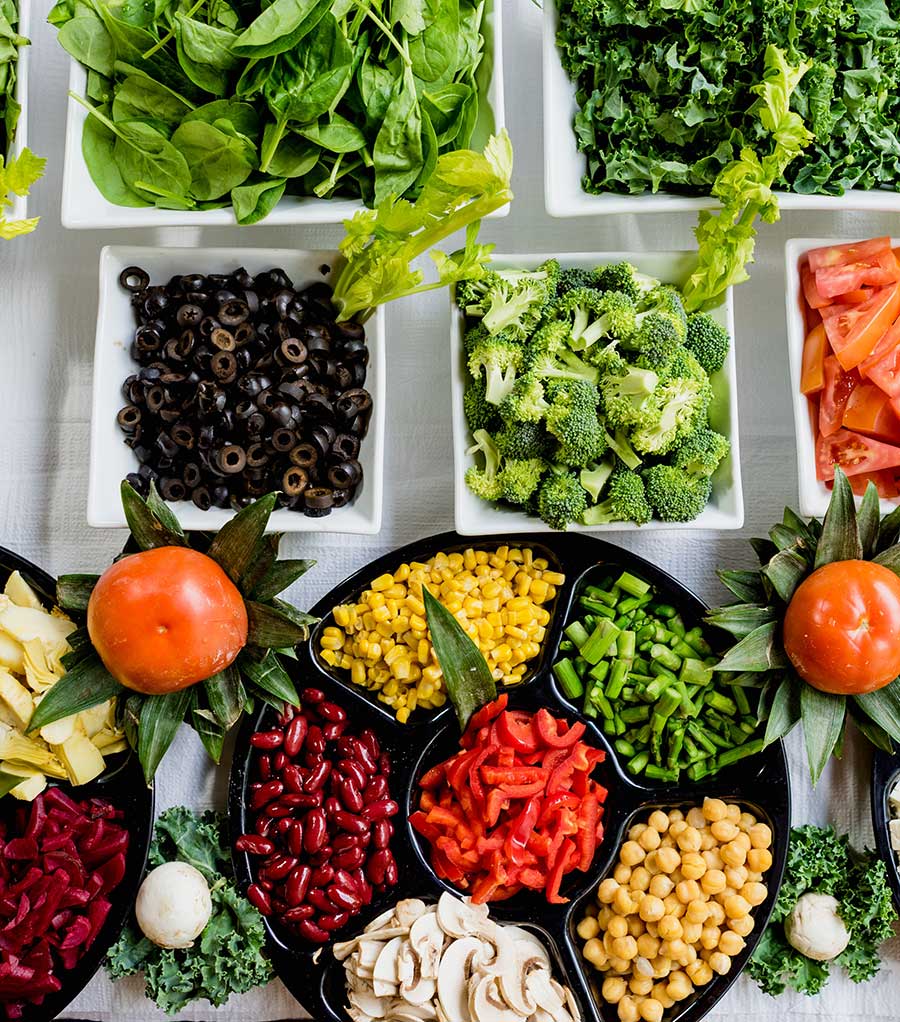On April 14, 2019, our Veggie Fest team sat down with James H. Gruft, M.D.—a tertiary chronic pain specialist practicing in Oakbrook Terrace, IL—in anticipation of his talk at our Veggie Fest Presents! celebrity speakers’ event. He will speak on the topic, “Boost Your Brain Power through Healthy Eating.” It will take place on Saturday, April 27, 2019 from 1pm – 2 pm at the Science of Spirituality International Meditation Center in Lisle, Illinois.
Dr. Gruft has been practicing medicine for nearly 3 decades and has been a lacto-vegetarian all that time. His interview took us on a fascinating journey through the world of nutrition and how it impacts all aspects of our lives.
Question: When did you first notice a connection between pain and diet?
Dr. James Gruft: I treat people with chronic pain conditions at my medical practice, From Pain to Wellness in Oakbrook Terrace, Illinois. My patients are comprised largely of those who have been failed by the medical system in the sense that their pain has not resolved as a result of various treatments. By the time they reach me, they might have gone through a few operations, injections, medications, and other traditional ways to eradicate pain. Unfortunately, these have proved unsuccessful which is why they are coming to me.

A chronic pain specialist has to have a wide palette of therapies because conventional medicine has already been tried and has failed. What struck me early on, when I was working at Marianjoy Rehabilitation Hospital in Wheaton, was that physicians were not taking into account what patients were putting in their bodies—through their diet—and it just didn’t make sense to me. How can there be such an intense focus on interventions, injections, surgeries, physical therapy, acupuncture, etc. and such a disregard of the foods that patients are eating?
I began to seek out how I could get an idea of my patients’ nutritional states, and I stumbled onto a testing company in North Carolina that, back then, was called The Great Smoky Mountain Lab. I started ordering blood draws and urine testing of my patients, which were sent to this testing company, and once a week I would schedule time to analyze the tests with the lab doctors. As a medical doctor, I received very little education in nutrition. The profiles I was getting back were very complex. The lab doctors educated me about nutrition and what these deficiencies, biomarkers and cofactors meant. That was the beginning of my journey into nutritional medical therapy.
When I first started down this road, I assumed that my patients would have some nutritional deficiencies: I imagined I would tweak them, and they might feel a little bit better. What I found, however, was astonishing: More than ninety percent of the patients I tested had serious nutritional deficiencies!
Question: Did these patients include vegetarians who were also deficient?
Dr. James Gruft: Vegetarians looked far better on the nutritional evaluation because most nutrients come from fruits and vegetables. There are nutrients with names people don’t even know called phyto-nutrients that only come from plant-based foods. So vegetarians did better on the testing but there may still be some deficiencies. They might have to take more foods with B vitamins or essential fatty acids and eat a little more protein, but their scores were strikingly better than the non-vegetarian population.
Question: So better nutrition leads to better health, but how does it impact pain?
Dr. Gruft: Take a vitamin everyone is familiar with, vitamin D. It is considered the sunshine vitamin and people often become deficient during the winter when they don’t get enough sunshine. The main plant-based sources for vitamin D are mushrooms, cheese, and fortified foods. If you don’t get enough vitamin D as a child, and you’re severely deficient, you get rickets. Rickets is a softening of the bones. Kids with rickets may have bowing of their weight-bearing bones. Adults can also develop a severe vitamin D deficiency which is called osteomalacia and the manifestation of osteomalacia is bone and muscle pain. Hence, a deficiency in vitamin D can lead to pain.
There are quite a number of other nutrients that—if you’re deficient—can also lead to pain or exacerbate pain, such as a deficiency in the B vitamins and in amino acids. Slowly but surely, I discovered that correcting these deficiencies could help with my patients’ pain.
Question: I read in your book, From Pain to Wellness, that physical pain doesn’t always occur in isolation from emotional pain. When you began treating your patients with nutrient rich vitamins, what changed for them?
Dr. James Gruft: One of my patients was a burger-and-fries kind of guy, and at that time in our program we actually served lunches that consisted of raw vegetables, nuts, dried fruit. This patient went through our 4-week program, and after about 2 weeks he said, “Something amazing is happening to me: I’ve been in a fog for years, but now my mind is clearing. For the first time in 10 years I can think clearly.” At the end of the program he told me that he started insisting that his wife and children eat at least one salad every day! He became a convert toward eating healthy whole foods.
The other aspect—and this happens commonly—is that once people start eating healthy, they start to become turned off to unhealthy foods. They intuitively gravitate toward more nutritionally rich foods.
Question: You are on the cutting edge of physiatry because of the way you look at and treat pain. In your practice you prescribe nutrient rich vitamins, physical therapy, psychiatry, homeopathy, acupuncture, and traditional pain medications—depending on your patients’ needs. You began this holistic approach long before it became popular to do so. How was this experience for you?
Dr. James Gruft: I have been a lacto-vegetarian for over 30 years, and I made the change to a vegetarian life, not at first because I considered it to be healthier, but because I was taught by my spiritual mentor that it would help me develop spiritually to develop an inner life.
When I worked at Marianjoy Rehabilitation Hospital, on Fridays the medical practitioners would be served lunch. I would join the other doctors and the more senior members of the medical team would make fun of me for not eating meat, eggs, fish, or fowl. Years later, I met the very same doctors at different conferences and they would come up to me to say, “I’ve really cut down on my meat, and I am feeling better! What do you think about kale; what do you think is a good way to prepare it?” These same doctors began to change, as the world changed, as the culture changed to eating a healthier diet filled with whole plant-based foods.

Question: This shows that, although they were teasing you, that you were making an impact on them by modeling healthy eating. One thing we rarely talk about in the medical community is the importance of our medical doctors modeling the lifestyle they are prescribing. Can you briefly speak to this?
Dr. James Gruft: A doctor’s recommendation to a patient will necessarily have more power if the doctor is living up to the message he or she is trying to convey. The opposite is true as well. I remember my first clinical rotation was with a chain-smoking internal medicine doctor. I distinctly recall him yelling at one of his patients to stop smoking. How much impact can that request have? A doctor of functional or lifestyle medicine needs to live up to the principles he or she is teaching.
Question: I feel like saying “hallelujah” to that! I know that you use traditional medications in your practice, too, that you’re not just saying “eat your broccoli and all will be well.” However, do you have any other success stories you’d like to share?
Dr. James Gruft: There are many stories, but I will share this one. One of my patients—she was a very well-dressed, elderly woman who suffered from fibromyalgia—and I began to give her nutritional therapy.
I’d like to interrupt the story for a moment and say that there some very hip, nutraceutical companies that concentrate acres and acres of nutrient rich algae into their products, and are able to extract two important omega 3 fatty acids, eicosapentaenoic and docosahexanoic acids. Likewise, B-12 can be generated by bacteria, and now there are some companies that produce a vegan source for B-12. Absolutely every nutrient you can think of is available in a plant-based form.
To get back to my patient. One day she said to me, “You know, Dr. Gruft, when you told me you were going to treat me through nutritional testing, I thought to myself, ‘He must be some kind of quack doctor.’ However, your credentials were good so I thought I’d give it a try. And I am amazed to find that my pain is so much better!” So she was quite skeptical at the beginning, but now her pain had subsided and she was able to perform her daily tasks with more ease.
Question: So there is a very real connection between nutrition, pain, and mental well-being?
Dr. James Gruft: This was somewhat of a surprise to me at first, that the lack of certain nutrients can lead not only to pain but to depression. Deficiencies of some of the omega 3 fatty acids, vitamin D, some of the B vitamins—especially B6, perodoxine. Although you may be taking antidepressants for the rest of your life, you will not get to the root of the problem if it is the result of a nutrient deficiency. Correcting deficiencies with some of these nutrients can have a huge impact.
At first, I was unaware of this connection. A patient once came back to me after I had treated her for a vitamin D deficiency and she said, “I notice that if I don’t take my vitamin D, my mood drops, and when I start retaking it again, my mood goes back up.” I looked into it and found that vitamin D elevates mood.
Question: So it is really a sunshine vitamin! Dr. Gruft, you have been a featured speaker at our Veggie Fest for many years, and you will be speaking at the festival this year. What do you love about Veggie Fest?
Dr. James Gruft: I absolutely love Veggie Fest. My girls were a few months old when the first Veggie Fest occurred. We brought them, and this might have been their first real outing. In fact, I have framed pictures of them from this first festival. We call them “the Veggie Fest girls,” because if you ever want to know how long the festival has been going on, just ask them how old they are.
Veggie Fest is so comprehensive and thorough that a new person wishing to be introduced to the vegetarian diet can find nothing better than Veggie Fest; there is nothing else like it: Veggie Fest offers great food at its international food court; people can attend food demos throughout the festival to learn how to make great vegetarian dishes; there are healthcare experts from many different fields talking about how this diet positively impacts health; it’s free entry, and a spectacular introduction to the vegetarian lifestyle for everyone!







